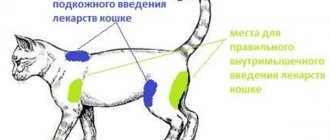A furry four-legged friend is a joy for any person. However, most experienced breeders are aware of a common problem - people adopt cats much less willingly than male cats. This is due to the fact that few people want to deal with a pregnant cat and then place her kittens in safe hands. In this case, there is a need for timely sterilization of the animal, which will avoid discomfort for both the pet and its owners. Today I will tell you what cat sterilization and how to prepare your pet for it.
What is cat sterilization?
When bringing home a small kitten, people are often concerned about issues such as nutrition, training, hygiene and care of the animal. However, over time, closer to six months of age, cats begin puberty, which is accompanied by discomfort and even pain. The animal begins to mark in the corners, feel weak, meow loudly, causing discomfort to you, and maybe even your neighbors.
Don't think that the cat's character has simply deteriorated. Thus, she communicates that she is ready to reproduce and actively calls the cat. Some people prefer to forego surgical interventions, limiting themselves to tablets or injections that ease the animal's discomfort. However, modern veterinarians unanimously advise to gather courage and take your pet for sterilization.
To be brief, the procedure of sterilizing a cat is an operation that can deprive the pet of the opportunity to have offspring. Despite the various methods performed by veterinarians, the purpose of surgery is to remove reproductive organs that affect the hormonal levels of the animal’s body.
The sterilization procedure is applied specifically to cats. If you get a cat, at puberty the animal is not sterilized, but castrated.
Castration: pros and cons
Whether to castrate a cat or not depends on the will of the owner of the animal. The operation may not be necessary if the pet has the opportunity to go for free walks outside. This will allow him to release accumulated sexual energy and aggression. But this option also has its pitfalls, because on the street a cat can meet an equally “preoccupied” male and then a fight is inevitable. During such a confrontation, the animal may suffer physical harm.
Housing a sexually mature, uncastrated individual is fraught with many problems. Therefore, many cat owners resort to forced measures to deplete them.
Brief information: surgical castration of animals is a surgical intervention, the purpose of which is to suppress libido (sexual desire) and eliminate the reproductive instinct. During the operation, the testes are removed under general anesthesia. As a result, hormonal levels change and testosterone ceases to be produced.
Important: the terms “castration” and “sterilization” should not be confused. In the first case, the testicles are cut out, and in the second, the spermatic cords are tied up, which makes it impossible to conceive offspring, but does not cancel all manifestations of sexual desire.
Let's analyze all the pros and cons of castration of cats.
Arguments in favor of surgical intervention:
- the cat becomes healthier due to the fact that nervousness due to unsatisfied sexual instinct disappears;
- the likelihood of escapes decreases, the male does not have an uncontrollable desire to go out the window of a multi-story building in search of a female;
- there is no desire to leave marks of one’s territory;
- the risk of diseases caused by forced sexual abstinence is minimized. For example, a prostate tumor, prostatitis, adenoma of the perianal (located near the anus) glands. Important: special studies have proven that infertility in cats reduces the likelihood of testicular cancer by 75%;
- the risk of contracting infectious diseases due to close contact with homeless street animals is reduced;
- Life expectancy increases by 1.5 - 2 years. This occurs due to a reduction in the incidence rate and a decrease in metabolic rate;
- the cat's character becomes softer;
- all other instincts are not violated. The animal continues to hunt and play;
- The number of stray kittens is not increasing.
These were the arguments for castration, now let’s look at the arguments against the operation:
- the reluctance of the pet owner to interfere with the natural course of events;
- small population of a particular breed;
- the fragile health of some artificially bred breeds;
- the possibility of obesity due to poor nutrition due to a decrease in metabolic rate;
- potential prospect of obstruction of the urethra with sand due to the occurrence of urolithiasis;
- the animal has chronic diseases in the acute stage;
- general weakness of the body;
- intolerance to anesthetics;
- The cat is over 8 years old.
Is it necessary to sterilize a cat?
Since the operation itself is quite complicated, many owners of furry cats wonder whether they need to sterilize their cat. In fact, there is no clear answer to this question. Here everything will depend primarily on why you are getting a pet. If you plan to breed offspring and sell kittens (this is especially true for rare furry breeds), of course, there is no need for sterilization.
If you do not want to start breeding kittens, it is better to choose a good veterinarian and have an operation. This way you will avoid the need to use contraceptives for your cat and get rid of the discomfort that the animal causes you during the period of heat.
Why is a cat neutered?
The instinct to mark territory, calling for a female and scaring off rivals, turns the life together of people and a cat into a complete nightmare. Disgusting odors permeate the house, the cat is scolded for every puddle, causing him even more stress. In such a situation, castration of the cat is the ideal solution for everyone.
Nature created cats as wild animals, whose life is full of dangers. The reproductive instinct is designed to protect the population from extinction. By making cats domestic, we protected them from the dangerous outside world, which means there is no longer a need for such active reproduction. So why not give your pet a calm life without stress and risk to life by having your cat castrated?
At what age is it better to sterilize a cat?
Another aspect that interests many owners is: “At what age are cats spayed?” Experts recommend surgery after the pet is six months old. The most optimal time for sterilization is considered to be the age of the animal 7-9 months . It is during this period that puberty begins, which completely changes the hormonal background of the body.
Of course, if you got an adult cat or did not think about sterilizing the animal at an early stage, you can carry out surgical intervention at a more mature age. The main thing is to make sure that at the time of the operation the cat does not have any diseases - they complicate sterilization.
Important! Sterilizing cats too early (before six months) can negatively affect the health of the pet and lead to serious delays in growth and development.
Adult and elderly cats should be sterilized with extreme caution. The fact is that after 10 years the body has a hard time coping with the consequences of the operation. Therefore, before removing reproductive organs, the following procedures must be performed:
- donate blood for analysis;
- examine the heart;
- bring the animal for examination by a veterinarian.
Types of cat sterilization
Depending on how the cat is sterilized, there are several types of procedures:
- Ovariectomy. Another name for removing the ovaries. As a result of the operation, estrus stops, and the risk of ovarian cysts and false pregnancy also disappears.
- Ovariohysterectomy. Complex removal of the ovaries and uterus. A more complex operation that is used for cats that have already given birth, as well as for adult furry cats.
- Hysterectomy is the removal of one animal's uterus. The least common operation due to the threat to the pet's health.
- Tubal ligation. Preserves the hormonal background of the animal, but prevents the unwanted phenomenon of unwanted pregnancy. Please note that as a result of tubal ligation, the purr's behavior is unlikely to change. This method is more often used by sterilization centers to control the birth rate of stray cats.
Pros and cons of sterilization
Often, cat owners do not want to take their pet for surgery because the animal must “know the happiness of motherhood.” However, cats do not live by feelings, but by instincts.
Therefore, the cat does not experience “happiness” in motherhood. And what kind of happiness can we talk about when kittens are taken from their mother at the age of 2-3 months (after all, the later the babies are given away, the more difficult it is to find good hands for them). So, if you are not considering sterilization because of the moral and ethical aspect, it would still be more ethical to perform the operation.
Of course, in order to make a final decision regarding surgery, it is important to approach this issue from all sides. So, sterilizing a cat - pros and cons - let's look at each aspect separately.
Benefits of sterilization:
- The animal ceases to feel the discomfort that accompanies estrus.
- The risk of diseases of the ovaries and uterus disappears.
- The risk of tumors appearing on the reproductive organs is noticeably reduced.
- You won't have to adopt kittens, which is not so easy to do if the pet doesn't have a breed.
- The cat's behavior and character will noticeably improve. She will stop damaging sofas and armchairs, as well as meowing loudly.
Of course, in order to be prepared for anything, you need to know not only about the advantages, but also about the disadvantages of sterilization :
- Remember that this is a serious operation, after which (if unsuccessful) the purr may experience serious complications. Fortunately, the qualifications of most modern veterinarians allow surgical intervention to be performed without any problems.
- The operation does not last long, but the recovery period may be prolonged. Please note that all this time you will have to be close to your cat, who will be weak and helpless.
Certain advantages of castration
When castrating an animal, there is a certain list of positive aspects. First of all, the pet is freed from the influence of hormonal storms, the kitten’s behavior becomes more peaceful and predictable. The cat now pays all his attention to his owners, plays, and does not try to chase rivals or pursue cats in heat.
Let's consider the advantages of castration:
- Reducing injuries. Sexual desire is reduced, there are fewer reasons to get involved in a fight, jump from a balcony, or wander around.
- The urge to mark territory decreases. Here we need to make a reservation: the reason for the marks may lie in the psychological motives of the animal, not related to sexual needs. The cat urinates past the tray when it wants to “win back space”, due to stress, constant attention, or vice versa – lack of communication.
- Prevention of oncology in the genitourinary area. There is no need to use drugs to suppress heat, which consist of high doses of hormones.
- Behavior correction. The animal becomes a friendly and sociable big kitten. With reduced hormones, a cat's priorities change.
- If you are not a breeder, the operation will eliminate insemination with the cat and the birth of an unplanned litter.
Castration is a serious operation, although it has been practiced by veterinarians. The need for its implementation should be carefully considered by the owner.
Possible consequences for the cat
Now let's talk about the other side of the coin. First of all, the use of anesthesia has its negative sides. You can conduct a preliminary examination of your pet if you suspect hidden chronic diseases.
If the cat is not prone to disease and there are no dangerous pathologies in the family history, then there is no particular reason to carry out diagnostics and refuse castration.
Note!
Castration does not solve literally all behavioral problems.
Although castration is presented in veterinary medicine as an everyday procedure, for a pet it is stressful and interferes with the normal functioning of the entire body. Owners must understand full responsibility for the decision made and in the future adhere to all the doctor’s recommendations so that the cat enjoys activity and health. Be prepared for the possible purchase of special food and provide the animal with conditions to expel energy - otherwise, you may end up with a pet with obesity and the ensuing problems.
How to prepare a cat for sterilization?
If you still decide to take your pet to the veterinarian, let's figure out how to prepare your cat for sterilization. Over the course of a week, carefully monitor the behavior and changes in the animal’s health. Notice how good your cat's appetite is and how regularly she goes to the toilet.
Immediately before the operation, it is necessary to visit a veterinarian and undergo a comprehensive examination, donate blood and urine, a smear for microflora analysis, and also have an ultrasound of the heart and abdominal cavity.
Make sure that your cat does not eat anything for 12 hours before surgery. You should not give the animal water 6 hours before sterilization, otherwise the purr may vomit when anesthesia is administered. Vomiting in this state can lead to serious illness (pneumonia).
Be sure to prepare a carrier in which you will take the cat home. A soft cloth with a diaper should be placed at the bottom of the container or cage.
Important! Due to anesthesia, the animal's body temperature can drop significantly. So take a blanket to cover your cat.
Consequences of castration of cats
Contrary to the opinion that neutered cats are apathetic, pets do not lose their hunting instinct at all. They still love to play and now, without being distracted by libido, they can focus more on the game and relationships with their owners. Aggression disappears from the lives of furry pets, they become more balanced. The amount of sex hormones decreases gradually, so the desire to mark territory will also gradually go away.
Neutered cats have a reduced risk of diseases such as feline leukemia, feline immunodeficiency virus, and feline infectious peritonitis. Since the possibility of contact with other cats, sexual relations and fights for territory decreases.
Opponents of castration of cats claim that animals become obese after removal of their testes. This is partly true, since the animal's metabolism slows down. But this feature of neutered cats is easily regulated by a proper diet. And if you consider how much better and safer a cat’s life becomes after castration, then a slightly reduced diet is a minor change that the animal will quickly get used to.
Caring for your cat after surgery
Please note that after sterilization, the cat may feel weak for several days. The complexity of the manipulation is due to the use of anesthesia and, in fact, surgical intervention. This is why it is so important to figure out how to care for a cat after sterilization.
It is advisable that the animal be under the supervision of doctors until it recovers from anesthesia. This way you can be sure that the operation was successful.
Monitor the condition of the postoperative suture. In order not to injure him, buy a special blanket. It is sold at any pet store. This word, which may be unfamiliar to you, means an ordinary bandage that prevents dirt, dust and bacteria from getting onto the seam. In addition, the animal often likes to lick wounds with its rough tongue, which can damage the seam.
The effect of anesthesia on the animal’s body can be observed for another 2 days. Make your pet a sleeping place on the floor and make sure that the cat does not jump onto a chair or sofa. Weakness in the paws can lead to falls and injury.
It is advisable not to leave the cat in the same room with small children. For several days after sterilization, the purr needs absolute rest.
Check the seam. It should be clean and dry without drops of mucus or blood. At the first sign of infection, be sure to contact your veterinarian. Some doctors recommend washing the suture with conventional antiseptic drugs (for example, hydrogen peroxide or chlorhexidine).
Postoperative sutures are removed a week after the cat is sterilized. If there were no complications after the operation, the body will recover within 3 weeks.
Feedback from cat owners after sterilization
To make a final decision regarding sterilization of an animal, be sure to weigh the pros and cons. To understand the possible risks and special cases during operations, read the reviews left by furry owners after sterilization. Browse local forums to find a good clinic and experienced veterinarian.
Most purr owners speak about the operation as follows:
How much does it cost to sterilize a cat?
In many cities today there are sterilization centers that are ready to sterilize cats for a nominal fee of 80-100 UAH. in Ukraine (1200-1500 in Russia). However, if you are afraid to take your pet to such institutions, you can find private clinics that offer paid procedures.
Despite the complexity of the operation, it is not that expensive. On average, the price of sterilizing a cat is about 350-500 hryvnia in Ukraine, and from 2500 rubles in Russia. Some veterinary clinics perform laser sterilization, which will cost more, as will calling a doctor to perform the operation at home.
FAQ
Whatever sterilization method you choose, this operation is quite complex and requires a responsible approach. That is why the owners of purrs are tormented by dozens of questions. I will try to answer the most common ones.
Can a cat be spayed while in heat?
Strongly not recommended . It is advisable to wait for this period and go to the veterinarian when the animal’s hormonal levels stabilize. A rush of blood to the genitals may pose a risk of complications during surgery.
How is a cat sterilized?
Sterilization of animals is carried out in several stages:
- examination of the purr;
- administration of drugs to facilitate surgery;
- administration of anesthesia;
- removing hair from an area of skin;
- cutting the skin;
- removal of reproductive organs;
- suturing.
How long does it take to sterilize cats?
The operation itself lasts no more than 20 minutes. However, a preliminary examination and recovery from anesthesia slightly delays the process. So be prepared for your cat to spend about an hour in the veterinarian's office.
Should a cat be allowed to give birth before being spayed?
No, all modern veterinarians recommend sterilizing the animal before the first birth.
Is it possible to sterilize a pregnant cat?
In no case. A possible pregnancy should be excluded before surgery first.
Should an adult cat be spayed?
Only if you consider it necessary. In any case, with age, the animal’s hormonal background and its instincts weaken. So there is no particular need for surgery.
Moreover, many veterinarians do not recommend spaying purrs older than 10 years. At this age, a cat’s body can endure surgery and recovery quite hard.
Do I need to get vaccinations before sterilization?
To avoid infection, the animal should be vaccinated at least 4 weeks before surgery.
What is cat castration
Castration surgery for cats involves removing the testes, which are responsible for producing the hormone testosterone. With the cessation of hormone production, the cat’s sexual instinct decreases and reproductive function ceases. The pet becomes calmer and more balanced. He may still be interested in the opposite sex. Only now he would rather choose the comfort of home rather than the dubious joys of wandering.
Castration of a cat usually takes place in 5–10 minutes. The cat is put into a state of deep sleep with special drugs. In some cases, surgery is performed under local anesthesia. The surgical area is cleaned of hair and treated with antiseptics. The surgeon then makes an incision over the testes, removes them and cuts them off. In this case, the spermatic cords and vessels are pulled together. The wounds will quickly heal after surgery. On the same day the cat goes home. In this way, stress for the animal is minimized.











